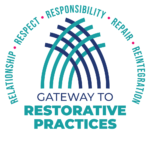
Have any of these situations ever happened with your kids?
- Your preschooler colors on the wall
- Your school-age child takes something from school
- Your junior higher cuts class
- Your teenager shoplifts
When a parent discovers one of the dilemmas above, the first question that spurts from his/her mouth is, “Why did you do that?” quickly followed by, “What were you thinking?”
Parents and teachers, here’s the answer:
They don’t know why they did that. Plus, your rhetorical questions aren’t meant to be answered. They’re simply disguised as an outlet for your anger.
Now that you know, will this profound answer prevent you from repeatedly asking, “Why did you do that?” Probably not, but maybe an explanation will.
The authors of The Restorative Practices Handbook explain,
“Young people usually don’t know why they did something wrong. In all likelihood they were simply being thoughtless or impetuous, without any reason. If we press for an answer, kids dig up a reason that usually sounds more like a rationalization or justification.” 1
The authors continue,
“What is more effective is to foster a process of refection by asking questions that will get the misbehaving young people to think about their behavior and how it impacted others.” 1
So next time your child or student does something that angers you, resist the urge to ask, “Why did you do that?” In the next blog, learn what to ask instead of why.
Sources:
- The Restorative Practices Handbook: for Teachers, Disciplinarians and Administrators, Bob Costello, John Wachtel, & Ted Wachtel, International Institute for Restorative Practices, 2009.
- Image: Question mark 1.svg [commons.wikimedia.org]

